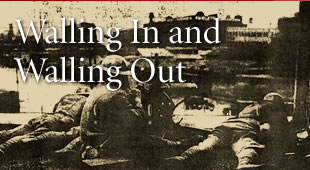
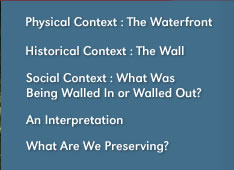

Social Context: What Was Being Walled In or Walled Out?
Whatever else they accomplished, the bulkhead buildings concealed the work of the piers from public view. They also effectively converted public space to private control, and these changes paralleled a simultaneous radical alteration in the labor system along the waterfront.
In concealing the work from view, the buildings echoed the rapidly developing overall segregation of urban areas and activities along class lines. The unsightly spectacle of socially marginal workers engaged in dangerous brute labor, in an occupation with extraordinary rates of death and injury would no longer discomfort those not directly involved. But at the same time, the general public would no longer observe longshoremen’s work being done as a regular part of its own daily experience, and the men who performed it would thereby be more distanced from the surrounding society.
The episodic nature of longshoring, which utilized a casual work force, without regular hours of employment, had always set longshoremen apart from the larger society. Workers were hired on an hourly basis only for the duration of an assignment, to load or unload a particular ship. The engagement might be even shorter than that, one particular hatch on the ship or one of several different cargoes. Upon completion, the men were unemployed until the next ship arrived, or longer if they could not get that assignment. Nor was there any guarantee there would be a next assignment. As a result of this system, most of the longshoreman’s time was actually spent waiting for employment, as close to the site of potential employment as possible.
Although some could create a stable family life in these circumstances —generally by doing other types of work in addition—the profession also included a large number of single men who lived in the many workers’ hotels and rooming houses near the piers, and who could be seen "loafing" on the street or in the many neighborhood saloons, at hours when "decent" citizens should have been working. In fact, these activities were a vital part of the system by which knowledge was exchanged about ship arrivals and labor requirements. With the advent of the new streetwall, decent citizens would no longer witness the difficult, dangerous work these men performed, only their more disreputable time between jobs.
‹ Previous | Union Context »
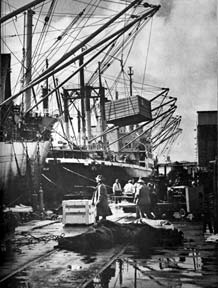 |
|
| Pier apron cargo operations | |
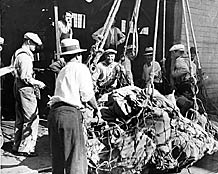 |
|
| A sling of cargo on the pier apron | |
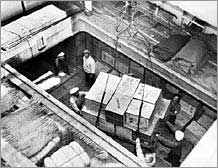 |
|
| A pallet of cargo comes out of the hold. |